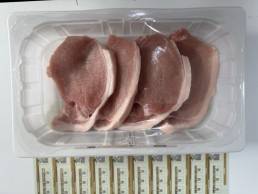ReFED Guest Blog
Digitising date labels to minimise food waste
Our solution featured as a guest blog on ReFed’s website, where we shared our approach to revolutionising the way we manage food spoilage. Read more on ReFED.

A more sustainable future
Expiration dates are typically set to account for the worst-case scenario, meaning that in most cases, food remains safe to eat even after the labeled date has passed. However, because these dates are fixed, billions of dollars worth of fresh food are wasted unnecessarily. By replacing fixed expiration dates with dynamic shelf-life notifications, fresh food waste could be reduced by 50%.
Instead of a fixed date, food should actually tell you how fresh it is.
Our technology
We have developed cutting-edge RFID smart labels that offer precise insights into the freshness of food. By digitally measuring the spoilage gases inside food packaging, our technology empowers food producers, retailers, and consumers to make better decisions about when food should be consumed or discarded.
The goal? To minimise food waste, both in commercial supply chains and at home.
Unlike traditional printed “best before” or “use by” dates, our digital labels give real-time data on the freshness of food, significantly reducing waste due to inaccurate or overly conservative expiry dates. Our method is not only more accurate but can also uplift sustainability efforts in the food supply chain, helping companies and households cut down on food waste, which is a major contributor to global greenhouse gas emissions.
Our vision
Food waste is a critical issue globally, with millions of tonnes of perfectly edible food being thrown away each year because of confusion over, or strict adherence to, date labels. At BlakBear, we’re tackling this with our sensor technology and AI software that monitors in-pack spoilage and displays shelf life insights on a dashboard. Our smart labels take the guesswork out of determining food freshness, helping to ensure that food stays on the shelf and in consumers’ homes longer, reducing unnecessary waste.
One of our biggest challenges is convincing both companies and consumers to shift from traditional printed date labels to our digital smart labels. However, with food prices rising and increasing public awareness making food waste less acceptable, the need for a more accurate and sustainable solution is clearer than ever. Our proven track record of reducing waste across major supply chains gives us confidence as we push forward. We’re committed to refining and expanding our technology for broader, global adoption, ensuring it benefits the entire food system.
To learn more about our technology and how our mission is contributing to a more sustainable food system, you can read our full guest blog on ReFed’s website here.
Schedule a demo
Let's shape the future of food quality and food waste.

